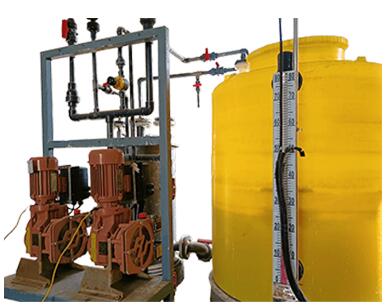Post time: Jan-31-2024
What are Metering Pumps Sensitive to?
Metering pumps play a crucial role in various industries, ensuring precise and accurate dosing of fluids. These pumps are widely used in applications where exact volumes of liquid need to be dispensed, making them essential for processes ranging from water treatment to chemical manufacturing. However, to maintain their efficiency and longevity, it's important to understand what metering pumps are sensitive to.
Chemical Compatibility
One of the primary considerations when operating metering pumps is chemical compatibility. Metering pumps often come into contact with a variety of chemicals, and not all materials are compatible with every substance. The pump's wetted components, such as diaphragms, valves, and seals, need to be made from materials that resist corrosion and degradation when exposed to the specific chemicals being pumped. It is crucial to consult chemical compatibility charts provided by pump manufacturers to ensure optimal performance and prevent damage.
Viscosity and Temperature
Viscosity and temperature are two interrelated factors that significantly influence the performance of metering pumps. Changes in the viscosity of the pumped fluid can affect the pump's ability to accurately dispense the desired volume. Additionally, temperature fluctuations can impact the viscosity and may cause variations in the pump's output. Manufacturers provide guidelines on the acceptable viscosity and temperature ranges for their pumps, and it is essential to operate the pump within these specified parameters for optimal results.
Pressure and Flow Rate
Metering pumps are designed to work within specific pressure and flow rate ranges. Operating the pump outside these prescribed limits can lead to issues such as cavitation, which occurs when the pressure on the suction side of the pump drops too low. Cavitation can cause damage to the pump components and compromise its efficiency. Regularly monitoring and maintaining the correct pressure and flow rate are essential to prevent such issues.
Maintenance and Calibration
Regular maintenance and calibration are critical for the proper functioning of metering pumps. Over time, wear and tear on components can occur, affecting the pump's accuracy. Routine inspections, parts replacement, and calibration checks are necessary to ensure that the pump continues to dispense fluids accurately. Manufacturers typically provide maintenance schedules and guidelines to help users keep their metering pumps in optimal condition.
Particulate Matter and Filtration
Metering pumps are sensitive to the presence of particulate matter in the pumped fluid. Foreign particles can damage delicate components, such as valves and seals, leading to malfunctions. Installing proper filtration systems is crucial to prevent these issues. Regularly checking and cleaning filters can help maintain the pump's efficiency and extend its lifespan.
Conclusion
In conclusion, metering pumps are sensitive instruments that require careful attention to various factors for optimal performance. Chemical compatibility, viscosity, temperature, pressure, flow rate, maintenance, and filtration all play crucial roles in ensuring the accuracy and longevity of metering pumps. By adhering to manufacturer guidelines and best practices, users can maximize the efficiency of their metering pumps and avoid potential issues.
For further information on metering pumps or to inquire about a reliable supplier, please don't hesitate to contact us. Our knowledgeable team is ready to assist you in finding the right solution for your specific needs.


















